Seleucus Nicator. Companion of Alexander the Great and the last of his diadochi
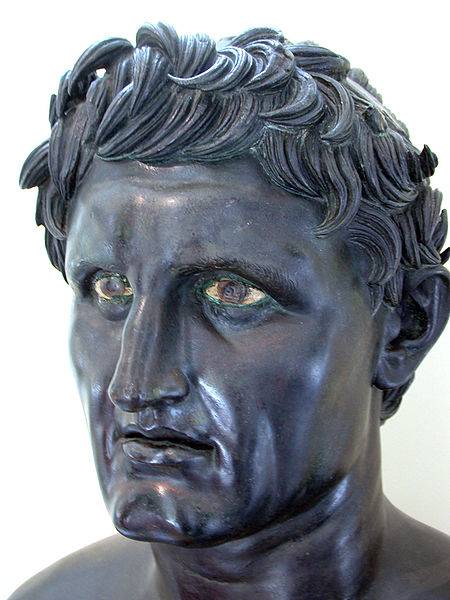
Bust of Seleucus I, bronze, Naples
Talking about the collapse of the failed empire of Alexander the Great, we recently talked about the Hellenistic state created in Egypt by Ptolemy Soter, one of the Diadochi commanders and a childhood friend of this great king. But the state of his other comrade-in-arms, Seleucus Nicator, turned out to be even larger in size.
As we remember, after long disputes, Perdikka, the commander of the cavalry units of the Macedonian army, who was married to Alexander's sister Cleopatra, was chosen as the regent of the empire of the deceased Alexander. It was to him that the dying king gave the ring with the seal. Perdikka divided the conquered provinces between the closest associates of Alexander, who were declared diadochi, that is, successors. They were supposed to rule their regions on behalf of two co-ruler kings.
The first of them was the baby Alexander, the son of the great conqueror, born of him by Roxana. The second is Arrhidaeus, Alexander's feeble-minded half-brother. Officially, the diadochi were still called satraps, that is, in a literal translation from the ancient Persian language (xšaθrapāvan) “guardians of the kingdom”.
However, to “preserve the kingdom” in the conditions of an extremely weak central authority, and even more so to obey one of the former friends, there were no willing ones among the Diadochi. But simply unbearable was their desire to "privatize" the piece of the empire that had been "inherited", while pinching off as much as possible from the possessions of their neighbors.
As a result, Perdikkas, who was too serious about his duties as regent, was killed very soon. Then they got rid of Alexander the Younger and Arrhidaeus, who interfered with everyone (and at the same time from Hercules, the illegitimate son of the conqueror, born to the Persian Barsina).
Antigonus One-Eyed and his son Demetrius Poliorketes ("Besieger of the City") were the first to take the royal title, followed by Ptolemy. All the rest of the Diadochi followed their example.
The successors of Alexander the Great almost immediately began to fight among themselves. There were five of these wars, they lasted 20 years, and almost all of the first diadochi died a violent death. Only three of them died in their beds - Ptolemy, Antipater and his son Cassander.
But today we will talk about Seleucus.
Seleucus in the army of Alexander the Great
This man was born in the city of Europos, which is located in the north of Macedonia, either in 358, or in 354 BC. e. Recall that Alexander the Great was born in 356 BC. e.
Seleucus' father, Antiochus, served in the army of King Philip in a not very high command position. But to Seleucus, who received the crown, such an origin seemed too insignificant and even offensive, and therefore it was announced that Laodice, the mother of the future king, gave birth to him from Apollo, who allegedly took possession of her in a dream. In the same dream, God gave Laodike a ring with an anchor, and on the body of the newborn Seleucus there was a birthmark similar to an anchor, which, by the way, was also found on his children and grandchildren.
It is difficult to say whether Laodike really saw this erotic dream? Or was the story about him invented later and not even by Laodice? But he came in handy. Indeed, why is Seleucus worse than the same Ptolemy, who considered himself a descendant of Dionysus? Even better - Apollo will be more authoritative on Olympus. However, Seleucus still called the cities in his state Antioch, not Apollonia.
It must be said that Seleucus, unlike Hephaestion, Ptolemy, Nearchus or Crater, was not included in the inner circle of Tsarevich Alexander. In 334 BC. e. he went on a campaign against Persia in the rank of a lower-level commander, and some argue that he was even an ordinary infantryman. That is, the starting conditions for the future founder of a great state were much worse than for other Diadochi.
Seleucus took part in almost all major battles, including the battles of the Granicus (May 334 BC), Issus (November 333 BC), Gaugamela (October 331 BC) . With the army of Alexander, he reached Egypt, Bactria and Sogdiana, India.
His efforts and military merits were noticed, and in 329 BC. e. Seleucus was appointed one of the commanders of the "argiraspids" - an elite detachment of infantrymen who had silver-plated shields. Diodorus Siculus wrote of them:
And:
And the same author calls them "troublemakers."
At first, the Argyraspids were led by Nicanor, the son of the commander Parmenion, who was killed on the orders of Alexander in 330 BC. e. He died of a fever, probably before the execution of his father and brother, Philotas. Then the Argyraspids were led by Neoptolem.
During the Indian campaign, Seleucus played an important role in the battle of the Gidasp River (May 326 BC): it was his detachment that repelled the attacks of the war elephants of King Por. After this battle, Seleucus began to be called Nicator - "Victorious".
However, Alexander, apparently, believed that this brave Macedonian did not have the gift of a commander, and therefore he never entrusted him with independent command: on the battlefield, he only clearly carried out the royal orders. If this is so, then we must admit that the great conqueror was mistaken: Seleucus then defeated his recognized generals. But, most likely, it was a matter of insufficiently high origin: representatives of the Macedonian aristocracy, who knew Alexander from childhood, simply did not want to obey Seleucus.
In 324 BC. e. Alexander in the city of Susa organized the marriage of 90 Macedonians and Hellenes with the daughters of Persian aristocrats. The king himself, who was already married to Roxana, married the daughter of Darius III Stateira and the daughter of Artaxerxes III Parisatis.
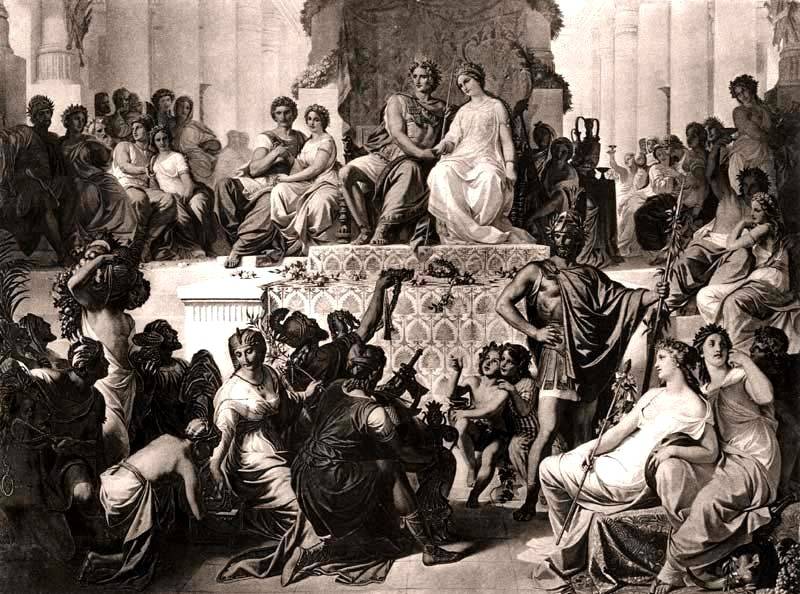
In this painting, painted by an unknown artist in the XNUMXth century, we see Alexander and Stateira in the center, next to Hephaestion and the Persian princess Dripetida
Seleucus went to Apama, whom most authors call the daughter of the Sogdian leader (and leader of the uprising) Spitamen, and Strabo - the daughter of the satrap of Bactria Artabazus. The marriage, apparently, was successful, because after the death of Alexander, only three people did not divorce Persian wives - Seleucus, Ptolemy and Eumenes.
Apama bore Seleucus four children, one of her sons, Antiochus I, became the second ruler of the Seleucid state. In honor of Apama, Seleucus later named three cities of his state.
Seleucus and Perdiccas
As we have already said, Seleucus, by virtue of his origin, was not included in the inner circle of Alexander's associates. And therefore, after his death, he did not receive his satrapy.
On this map we see the distribution of the satrapies by the regent of the empire, Perdiccas. The name Seleucus is not on it:
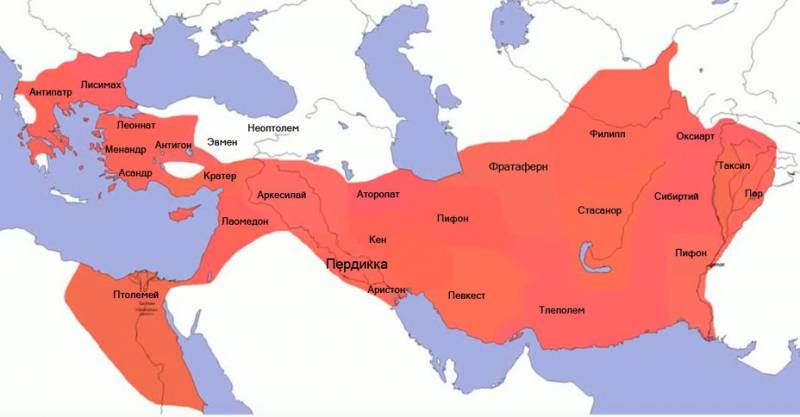
The brave and diligent servant Seleucus became the commander of the regent's hetairos - the position, of course, is very high and honorable, but in fact it should have been the pinnacle of his career. However, Ptolemy, appointed satrap of Egypt, stole the body of Alexander, which, in a luxurious sarcophagus similar to a small temple, was sent for burial in Macedonia. Meanwhile, a prophecy was received about the great future of the state, in which the remains of this conqueror would find eternal rest.
The indignation against Ptolemy was universal, and Perdiccas, as regent of the empire, organized a campaign against the rebellious Diadochus. Approaching the borders of Egypt, he summoned Ptolemy to the court of the Macedonian army. To his great surprise, Ptolemy appeared at the camp. He was popular with the troops and defended himself so well that he was acquitted by the soldiers.
Nevertheless, Perdikka continued his campaign. During an unsuccessful crossing of the Nile at the Egyptian fortress of Camila, about two thousand soldiers died. There could have been even more victims if it were not for the help that Ptolemy provided to his former comrades in a timely manner.
A powerful blow was dealt to the authority of Perdikkas, both the commanders of his army and ordinary soldiers showed indignation. The satrap of Media, Pithon, refused to obey the regent and announced that he was taking his people away. During this conversation, Seleucus and the new commander of the argyrospids, Antigens, burst into the tent, and dealt the first blow to the regent. Everyone else joined him. Perdiccas tried to defend himself, but soon fell, receiving many wounds, from which he died.
Antipater was elected the new regent of the empire, who took both kings to Macedonia.
Diadochus Seleucus Nicator
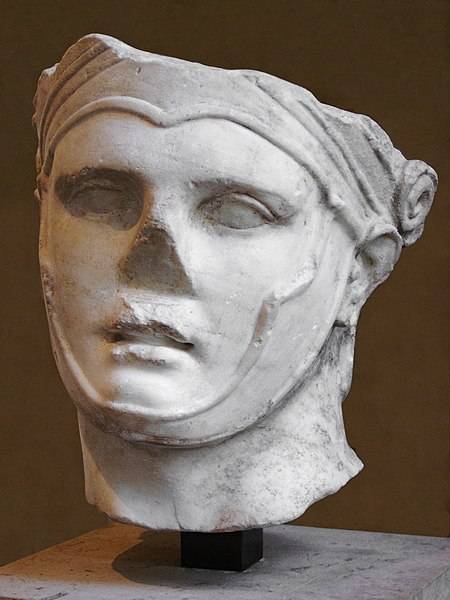
Damaged Roman copy of a bust of Seleucus, Louvre
According to an agreement concluded in Triparadis in 321 BC. e., the satrapies were also allocated to the murderers of Perdiccas. Antigen received Susiana, Seleucus - rich, but militarily very weak Babylonia. And therefore, it seemed that he had no chance in the fight against other Diadochi.
Indeed, already in 316 BC. e. Seleucus was forced to leave Babylon, occupied by Antigonus. He went to Egypt, where an alliance of Ptolemy, Lysimachus and Cassander was formed against Antigonus. In the battle of Gaza (312 BC), they managed to defeat the troops of Antigonus' son Demetrius. After that, Ptolemy allocated a detachment to Seleucus, with which he managed not only to return Babylon, but also to subjugate the Macedonian rulers of the eastern satrapies.
By 303 BC. e. the state of Seleucus already included Media, Persis, Susiana (Elam), Bactria and Parthia.
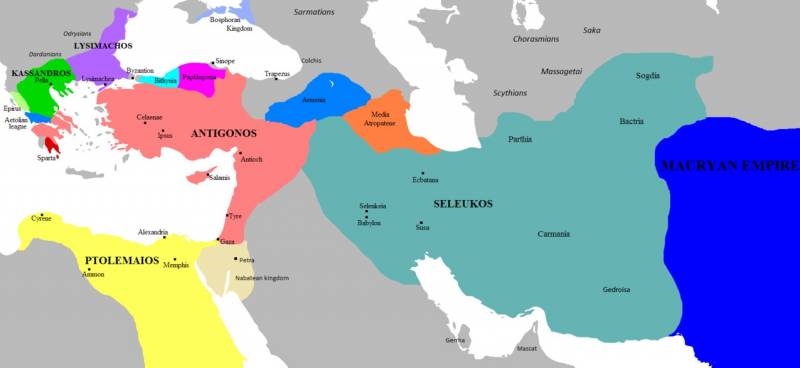
The possessions of the Diadochi before the battle of Ipsus (about 303 BC)
Sovereign Seleucus I Nicator
So the foundation of the future great state was laid, and in 306 BC. e. Seleucus proclaimed himself king. Even during his lifetime, he began to give divine honors. On coins, Seleucus I was depicted wearing a leather-covered helmet, decorated with a bull's horn and bull's ear, or wearing a diadem.
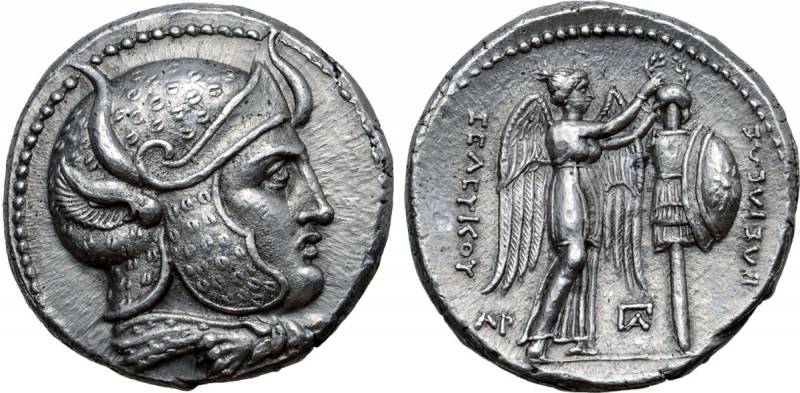
Seleucus I on a silver tetradrachm, minted between 300–281 BC BC e.
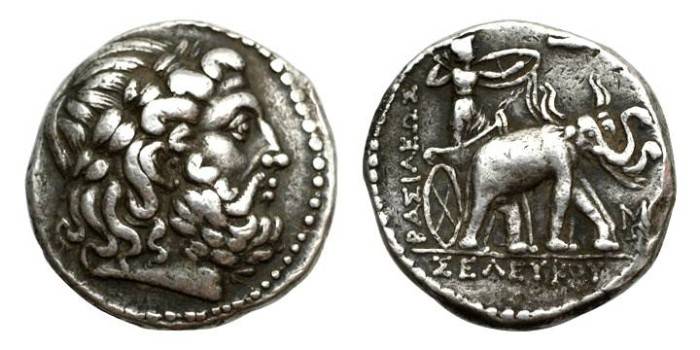
Seleucus I on a silver tetradrachm, 312–281 BC e.
In the summer of 301 BC. e. the army of Antigonus One-Eyed, in which his son Demetrius and the young Pyrrhus (at that time expelled from Epirus) were, met in Asia Minor at Ips with the allied forces of Lysimachus, Seleucus and Cassander. The forces of the parties were approximately equal, but the opponents of Antigonus had an advantage in the number of elephants - 480 versus 75. These elephants were received by Seleucus from the Indian king Chandragupta, who was married to some of his relatives in exchange for territories previously conquered by Alexander the Great - part of the Punjab, Gedrosia , Arachosia and Parapamisada.
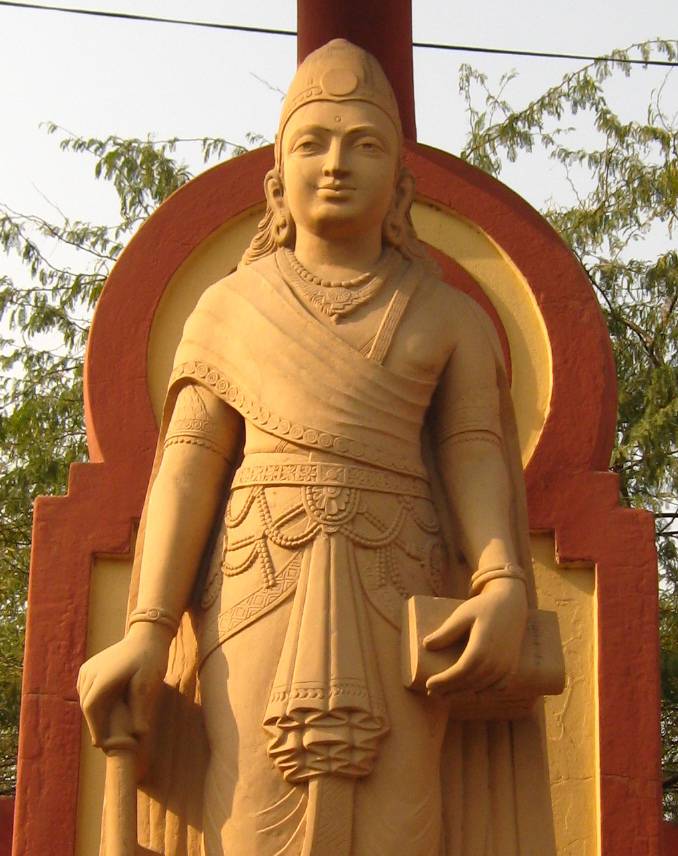
Statue of Chandragupta at Lakshmi Narayan Temple
The cavalry of Demetrius overturned the horsemen of the son of Seleucus - Antiochus, but was too carried away by the pursuit of the retreating enemy. When Demetrius returned to the battlefield, everything was already over, and his father had died in battle.
The power of Antigonus was divided among the winners, Seleucus, following a new agreement between the Diadochi, annexed Northern Mesopotamia, Northern Syria and a significant part of Asia Minor to his possessions. Now on the lands of the former empire of Alexander the Great there were four kingdoms: Ptolemy with the center in Egypt, Lysimachus in Greece and Asia Minor, the huge power of Seleucus and Macedonia, where the son of Antipater Cassander was entrenched.
In 294 BC. e. in the family of Seleucus an amazing story, about which Appian tells in his work Syrian Affairs.
After the death of his first wife, Apama, Seleucus married Stratonicus, the daughter of Demetrius Poliorcetes, the granddaughter of Antigonus One-Eyed. And his eldest son and heir Antiochus suddenly became seriously ill, and the court physician Erazistrat stated that the cause of the disease was the love of the prince for his young stepmother. Seleucus immediately yielded Stratonikos to his son, appointed him his co-ruler and sent him as governor to "Upper Asia" (provinces located east of the Euphrates River).
Antiochus at that time was not a romantic 17-year-old youth, but a man of 30 years old, and his father was either 60 years old or 64 years old. Perhaps this whole performance with Antiochus's illness was arranged only so that Seleucus could, under a plausible pretext and without scandal, transfer Stratonikos to his son, avoiding an internecine war with him.
Stratonika gave birth to two sons and three daughters: the eldest daughter - from Seleucus, the rest of the children - from Antiochus.
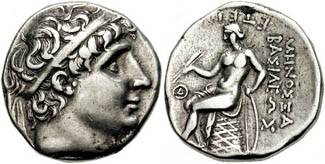
Tetradrachm of Antiochus I
In the same year 294 BC. e. Stratonika's father, Demetrius Poliorket, who ruled in Macedonia, captured Athens. But he was defeated when he recklessly marched against Lysimachus. In 285 BC. e. he was forced to surrender to his son-in-law, Seleucus. For two years, as an honorary prisoner, Demetrius lived in the Syrian city of Apomea (named after the first wife of Seleucus) and died in 283 BC. e. In the same year, Ptolemy died in Alexandria. And the last of the Diadochi - 70-year-old Lysimachus and 80-year-old Seleucus, took a personal part in the battle of Kurupedion (Syria).
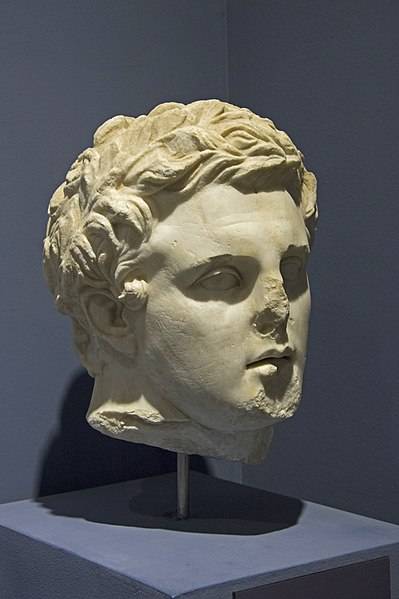
Bust of Lysimachus, XNUMXrd century AD e., Museum of Seljuk Culture, Kayseri, Turkey
Once Lysimachus managed to emerge victorious in a fight with a lion. Curtius Rufus claims that this happened during a hunt in Syria, Justin - that Lysimachus was thrown to be torn to pieces by order of Alexander the Great - as a punishment for daring to give poison to the philosopher Callisthenes, who was suffering cruelly in an iron cage. The image of a lion is present on the coins of Lysimachus.
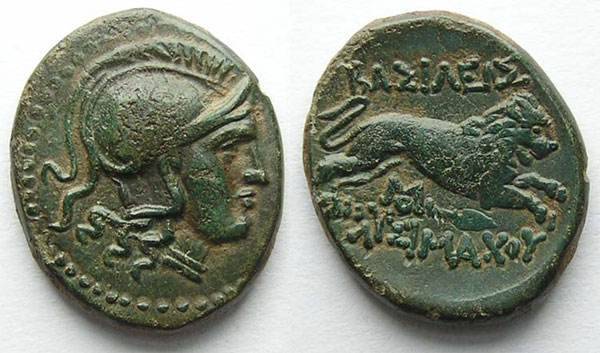
Bronze coin of Lysimachus depicting a lion and Pallas Athena
But now Lysimachus fell in battle, and his soldiers went over to Seleucus - after all, it was he who turned out to be the only living ally of the great Alexander. Seleucus went to subjugate Greece and Macedonia, but in 281 BC. e. during the passage through the Hellespont was treacherously killed by the son of Ptolemy I (and the grandson of Antipater).
It is said that Seleucus was stabbed in the back while inspecting the altar, which, according to tradition, was erected by the Argonauts. This Egyptian prince was called Ptolemy Keravn (Lightning), most authors believe that he received this nickname for his penchant for spontaneous rash acts.
Ptolemy Ceraunos was expelled from Alexandria by his younger brother, and in this, unfortunately, far from original way, Seleucus “thanked” him, who declared him his “guest and friend”. The murderer stated that the reason for his act was revenge for Lysimachus.
However, it is more likely that the reason for the murder was the proclamation of Seleukos himself as king of Macedonia, while Ptolemy himself expected to become the ruler of this country. He, indeed, became the king of Macedonia, but already in 279 BC. e. died in battle with the Galatians. Now Antigonus Gonatas, the son of Demetrius Poliorcetes, came to power in Macedonia. He married his niece, Phila, the half-sister of Antiochus I and the eldest daughter of that same Stratonika, the wife of Seleucus and Antiochus. Phila was born from Seleucus.
By the way, the son of Antiochus I and Stratonika (Antiochus II, grandson of Seleucus Nicator) was married to his own sister, Laodike. He later divorced her in order to marry the Egyptian princess Berenice, daughter of Ptolemy II. After the death of her ex-husband, Laodike poisoned her rival and her son. This was the cause of the Third Syrian War, which was waged by Berenice's brother Ptolemy III Euergetes and Laodice's son Seleucus II Kallinikos.
Hellenistic power of the Seleucids
The state created by Seleucus Nicator, which contemporaries often called "Syria", is striking in its size. The empire of Seleucus was so great that it had to be divided into 72 satrapies.
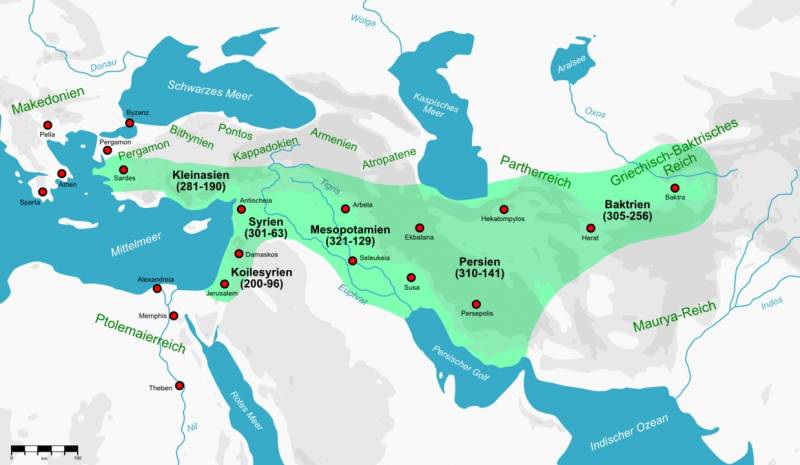
Seleucid state, map
But the power of Seleucus turned out to be much more “loose” than the state of the same Ptolemy Soter, formed around stable Egypt. The first capital of this "Syria" was the city of Seleucia on the Tigris, built in 305 BC. e. But then he lost this title to the one founded in 300 BC. e. Antioch the Great (on the Orontes). Now this place is the Turkish city of Antakya.
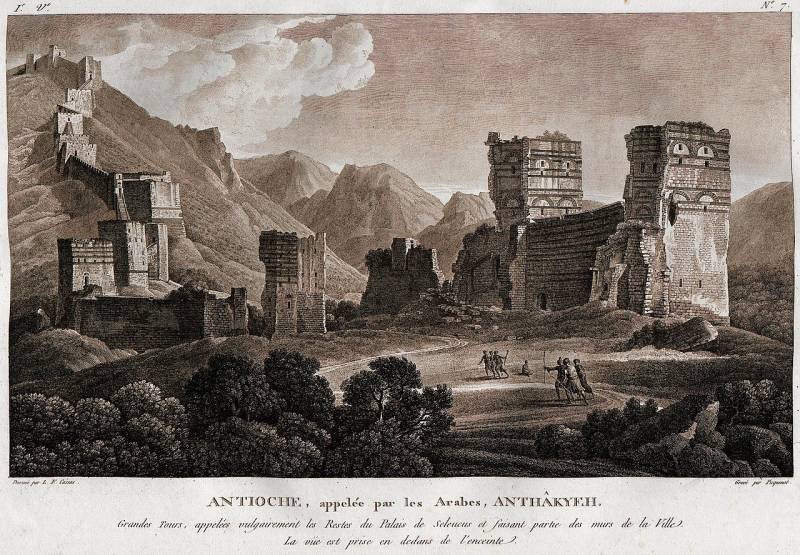
Louis Francois Cassas. Ruins of Seleucus Palace in Antakya, 1780s
In total, Seleucus managed to found 75 cities: 16 of them, in honor of his father, were named Antioch, and 5 - Laodicea, in honor of his mother. Nine cities became Seleucia. The name of the first wife was immortalized in the names of three cities, which received the name Apamea. In the name of the second wife (the one that Seleucus ceded to his son), only one city was named - Stratonikeia.
In grandeur and splendor, Antioch the Great was second only to Alexandria. It is said that in its best years the population of this city reached half a million people. But later, both Alexandria and Antioch the Great were eclipsed by Rome.
By the way, for some time even Jerusalem was ordered to be called Antioch. I must say that the Jews turned out to be very restless subjects, over the years: from 167 to 142 BC. e. they constantly rebelled (the so-called Maccabean War, described in the Bible), and in 134 BC. e. even achieved independence.
The richest areas of the Seleucid power were Northern Mesopotamia, Babylonia and Northern Syria. Of greatest importance was the territory called Seleucis, which included southeastern Cilicia, southern Commagene, and Upper Syria. Another name for Seleucis is Tetrapolis, she received it for the four main cities: Antioch, Seleucia (not to be confused with Seleucia on the Tigris), Apamea and Laodicea.
It must be said that Seleucus I turned out to be a very capable ruler who deserved high marks from ancient historians. Pausanias, for example, calls him "of all the kings, the most just man."
Like Ptolemy Soter, Seleucus relied on immigrants from Greece and Macedonia, who settled mainly in the west - in the territory of modern Syria, Turkey, Lebanon and Palestine. The cities founded by them enjoyed the rights of self-government. But Hellenic officials also ruled the Asian regions, and Greek-Macedonian garrisons were stationed in large cities.
Decline of the Seleucid Empire
The heirs of Seleucus Nicator turned out to be much less capable people. They were defeated by the Egyptian Ptolemies, Parthians and Romans, losing one province after another.
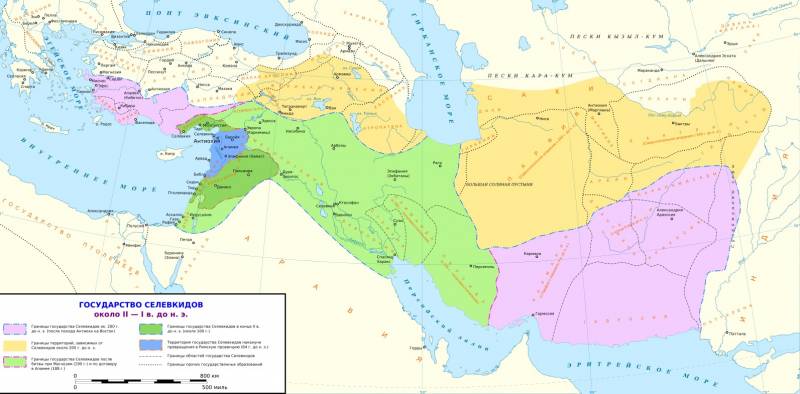
Seleucid state in 200–64 BC e.
The only strong king of the Seleucid state was Antiochus III, the great-great-grandson of the founder of the dynasty (222-187 BC). He conquered Palestine and Phoenicia from the Ptolemies, again subjugated Parthia and Bactria, after which he tried to conquer Greece.
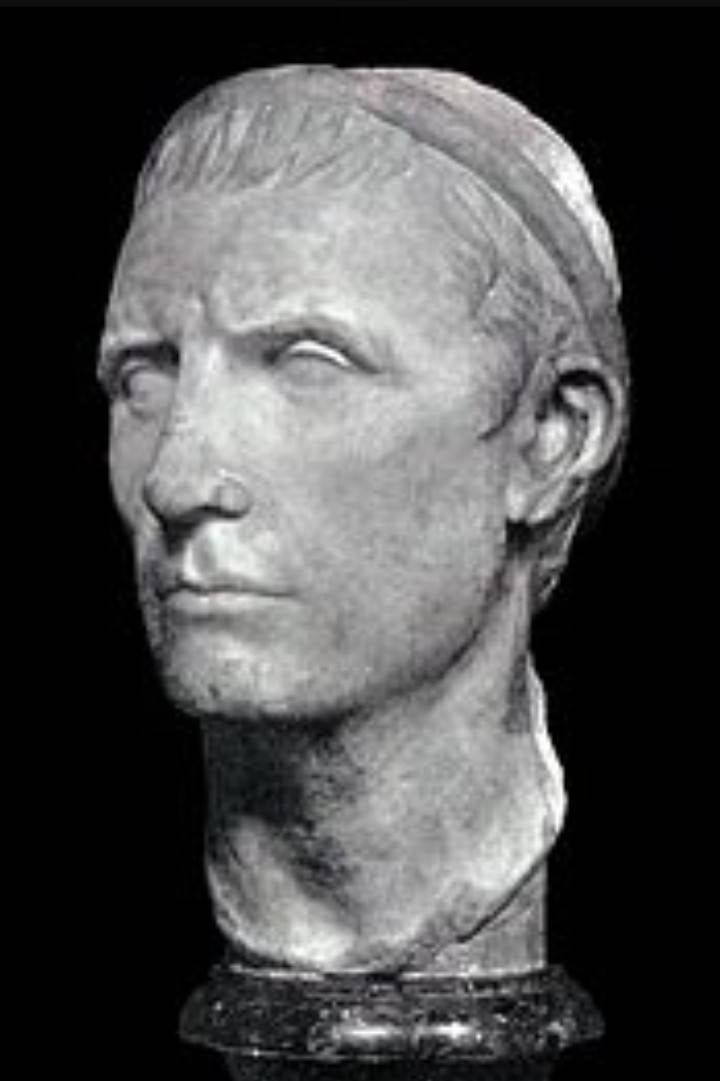
Antiochus III, marble bust, Louvre
It was to him that the famous Hannibal fled, fleeing from his enemies in Carthage. But Antiochus III was also defeated, having entered into a confrontation with Rome.
By the 64st century BC. e. from the huge state of Seleucus Nicator, only the lands of modern Lebanon and Syria remained. And in XNUMX BC. e. in this territory, conquered by Gnaeus Pompey, the Roman province of Syria was formed.
Information